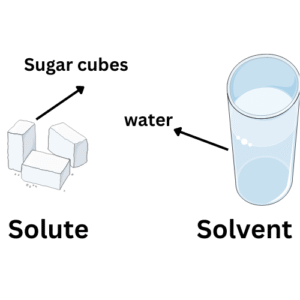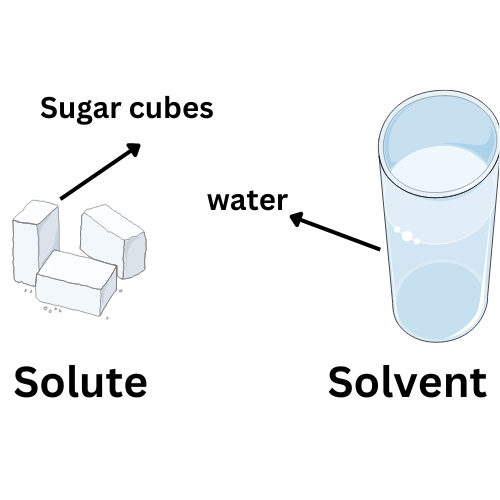A solute is a substance added to a solvent to form a solution. It exists in all three states i.e.: solid, liquid, and gas. While Solvents are substances that dissolve solute to make solutions.
In a solution, the solvent and solute are the main components. The quantity of solvent should be more than solute to form a solution.
 |
| Examples of Solute and Solvent |
In this article, we will discuss Solutes, Solvents, their examples, and the main differences between Solutes vs solvents.
Solute Definition
A solute is a substance added to a solvent to form a solution.
- It exists in all three states i.e.: solid, liquid, and gas.
- Solubility is the property of a solute to dissolve within the solvent. Solubility depends upon a number of factors.
- In a solution, the amount of solute is measured in terms of its concentration.
- The concentration of a solute is determined by the ratio of the solute to the volume of the solution.
- Solute has a higher boiling point than solvent.
- A heterogeneous is a type of mixture in which the concentration of solute is not distributed equally.
- Temperature directly affects the solubility of a solute when the solute is in solid and gas form. While Pressure only affects the solubility of the solute in gas form.
- Examples of solutes are salt in water, sugar cubes in tea, and protons in the cytosol.
Solvent Definition
- Most Solvents are found in a liquid state in nature, while some might be found in gas and solid form. For example, Brass is found in solid form.
- Solvent breaks down the particles of solute and dissolves them to make a solution.
- The solvent transfers heat in a solution.
- Carbon-containing solvents are organic while others are inorganic.
- Solvents are of two types, Polar solvents, and Non-polar solvents.
- Water is considered a universal solvent as it dissolves a number of solute particles within it.
- Solvents have a lower boiling point than solutes.
- All proportions of a solvent have an equal concentration of solute.
- Examples of solvents are water, oil, alcohol, etc.
Solute vs Solvent (Main Differences)
|
Basic For Comparision |
Solute |
Solvent |
|
Definition |
A |
Solvents are
|
|
Phase |
A dispersed |
A medium |
|
Quantity |
A solute is always |
The solvent is in |
|
Physical |
Solute |
Most of the |
|
State |
The solution |
The solution |
|
Boiling |
The boiling |
The boiling |
|
Solubility |
Solubility |
Solubility depends |
|
Heat |
Heat is |
Heat is |
|
Examples |
Salt in |
Water, oil, |
Examples of Solutes
Salt in Water
- Salt(NaCl) is a solute and water(H2O) is a solvent.
- The negatively charged ion of NaCl (salt) is attracted by the hydrogen particles of water(H20) which is slightly charged. Likewise, the attraction occurs between Sodium(Na) and Oxygen(O2) atoms.
- The attraction between them causes the breakdown of NaCl (salt) into small particles which then dissolve in the water.
- The surface area of the solute particle is responsible for the time period and range of solubility.
- No salt crystal will be visible, once all the Nacl (salt) is dissolved in the solution.
Carbon dioxide in Soda
- Carbon dioxide(CO2) is a solute and Soda (Carbonated drink) is a solvent.
- The bubbles and tangy flavors in carbonated drinks are caused by Carbon dioxide gas (Co2).
- This happens because carbon dioxide forms carbonic acid when dissolved in water ( in this case soda) which increases the pH level of it between 3 to 4.
Examples of Solvent
Water (Universal solvent)
- Water is called the universal solvent as it dissolves different types of solute particles than any other common solvents.
- Water is a very Polar Molecule. Oxygen is highly electronegative and increases the polarization in water.
- Water(H2o) can attract both positively charged and negatively charged ions as it has a slightly positive charge near the hydrogen(H2) and a negative charge near the oxygen(O2) atom.
- Water is an essential solvent as it travels and picks up different solutes along its way like minerals, salts, and different nutrients to keep our earth functioning.
Cooking Oil
- Cooking Oil is another important solvent as it prevents the sticking of solutes on the pan.
- We can cook our food with hot oil.
- If we compare, cooking oil with other petroleum products, cooking oil has a more dissolving capacity. It has also less effect on the environment and less toxicity
Watch Video Animation: Solute and Solvent (By makemegenius)


This note helped me to complete my assignment on time. I like to thank you for this notes on solute vs solvent.